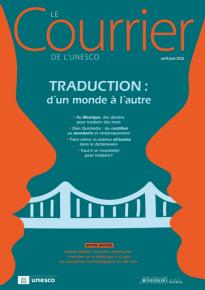فكرة
قِصص وطرائف من أمريكا اللاتينية على راديو أمبولانتي

مرشد روحيّ كولومبي متهم بالتغرير بعشرات النساء، أو كاتبة كوبية تستحضر طفولتها في هافانا، أو أحد هواة الفلك نجح في التقاط صورة انفجار نجمة من سطح منزله في روساريو بالأرجنتين: ثلاث نماذج متنوعة من القصص التي تقدمها راديو أمبولانتي (الإذاعة المُتنقّلة) التي تبث برامجها على إنترنت باللغة الإسبانية. كارولينا غِريرو، من مؤسسي هذه الإذاعة، تشرح أهداف هذا النوع الجديد من المحطات الإذاعية.
حوار مع كارولينا غيريرو، أجرته لوسيا إغليسياس كونتز (اليونسكو)
كيف خطرت على بالك فكرة راديو أمبولانتي (الإذاعة المُتنقّلة)؟
قبل عشر سنوات، كنت ودانييل ألاركون نعيش في سان فرانسيسكو. هو كاتب وأنا صحفية، وهو بيروفيّ وأنا كولومبية. عاش كلّ منا قصة هجرة مختلفة، لكن لدينا نفس التعلّق بأمريكا اللاتينية، ونفس الولع بثقافتنا الأصلية وثقافة أهلنا، فضلاً عن شغفنا باللغة الإسبانية. وكثيراً ما كنا نتناقش حول نوع من البرامج الإذاعية الطويلة التي يروي فيها الأحداث أبطال القصص ذاتهم، وهو نوع سائد في إذاعات القطاع العام في الولايات المتحدة. وقد كنا معجبين بهذا النوع بقدر ما كنا آسفين لعدم وجود برنامج مماثل يُذاع بلغتنا. ولما كان محتوى البرامج التي تُبث بالإسبانية في الولايات المتحدة غير جيد، كنا نتجه في النهاية نحو وسائل الإعلام والمضامين المعتمدة على اللغة الإنجليزية. وبما أن أمريكا اللاتينية قارة حافلة بالقصص والقصّاصين، رأينا أنه ينبغي إيجاد برامج من هذا النوع في لغتنا... وقررنا إنتاجها بأنفسنا.
حينها، فكّرتما في جمهور المستمعين اللاتينيين، أي المهاجرين الناطقين بالإسبانية المقيمين في الولايات المتحدة؟
عندما هاجرت إلى الولايات المتحدة منذ أكثر من عشرين عاماً، توقفت عن أعتبار نفسي كولومبية، إذا صح التعبير، وأصبحت لاتينية أمريكية. وانخفض عدد أصدقائي الكولومبيين، ليصبح لدي أصدقاء من كل مكان: من الشيلي والأرجنتين وفنزويلا وبورتو ريكو... فضلاً عن اللاتينيين المولودين هنا. لقد انفتح أمامي أفق جديد لأن هذه الانطلاقة الثقافية التي وجدتها في الولايات المتحدة جعلتني أدرك، خلافا لما كنت أظن، أني لم أكن أعرف أمريكا اللاتينية حق المعرفة. ومن ثمّ فكرة إنتاج مضامين لا تستهدف جمهور المهاجرين فحسب.
ومنذ البداية، أردنا أن تتسم قصصنا بطابع عالمي وأن يتماهى الجميع معها بطريقة أو بأخرى، وألّا يطغى عليها لا الطابع الإعلامي ولا الطابع المحلي... كما أردناها مسلية بما فيه الكفاية حتى تثير قصة من الشيلي اهتمام مستمع يقطن في حيّ برونكس، في نيويورك، أو يتابع شخص في كولومبيا قصة من غواتيمالا.
لماذا فضّلتم البث الصوتي الرقمي بدلاً من البث على الموجات الإذاعية؟
عندما انطلقنا في المشروع، كنا من جمهور المستمعين، ولم يكن لدينا أدنى فكرة عن طريقة تشغيل هذه الصناعة. وبدأنا في البحث عن أموال لمشروعنا هنا في الولايات المتحدة، وأدركنا أنه لا يوجد مجال لبعث محطة على الموجات الإذاعية وأنه ليس هناك من سيتيح لنا إمكانية إنشائها. وسرعان ما أدركنا أن التكنولوجيا الرقمية هي تكنولوجيا المستقبل، وأنه إذا أرادت راديو أمبولانتي وجود جمهور من المستمعين، فسوف يتحقق ذلك بوصفها وسيلة إعلام رقمية.
ما هي العلاقة التي تَربطكم بالمستمعين؟
في زمننا الراهن، من المستحيل تجاهل الجمهور. وما يتيحه لنا العالم الرقمي من تفاعل مستمر مع المستمعين قد لا يكون من اليسير تحقيقه على الموجات الإذاعية. وبالفعل، جمهورنا متكون من مجموعة من المستمعين الذين ينصتون إلينا، ويتحدثون عنا مع أصدقائهم ويعلقون على برامجنا بصفة إيجابية أو سلبية. كما أن هؤلاء المستمعين يشعرون بأن لديهم سلطة، فلا يترددون في مطالبتنا ببعض الأمور، والإشارة أحياناً إلى بعض الأخطاء... تربطنا بهم علاقة مباشرة.
ومنذ ثلاث سنوات تقريبا، نبذل أقصى جهدنا من أجل تعزيز الروابط مع الجمهور، من خلال فتح قنوات أخرى للاتصال مثل مجموعة «واتس آب» الموجهة للمستمعين الأكثر حماساً، والشروع في تقوية الاتصال المباشر مع المستمعين. كما أطلقنا مؤخراً «نوادي للاستماع» حيث يلتقي أشخاص لسماع قصة من قصصنا ثم التعليق عليها، على غرار نوادي المطالعة.
ما هو النموذج الاقتصادي الذي تتبعونه؟ وما هي مصادر تمويلكم؟
راديو أمبولانتي مشروع مكلّف. فريقنا متكوّن من حوالي عشرين شخصاً. هم لا يقومون بإنتاج برامج إخبارية ولا مقالات. جميعهم مكرسون لإصدار ثلاثين حلقة سنوياً. وإن كان هذا العدد قليلا، إلا أنها مشاريع طويلة المدى وتتطلب عملا تحريريا ضخما وقدرا كبيرا من الدقة. من حيث مصادر التمويل، نتلقى دعماً من بعض المؤسسات، وقمنا منذ ثلاثة أعوام، بتوقيع عقد توزيع حصري مع الإذاعة الوطنية العمومية في الولايات المتحدة وهي التي تقوم بتوزيع برامجنا في صيغتها الإلكترونية وتدفع لنا مقابلا ماليا. كما نقوم كل سنة بتنظيم فعاليات بالبث المباشر على المواقع المسرحية، ونعرض على الأشخاص الذين يرغبون في مساعدتنا على نحو منتظم إمكانية الانضمام لبرنامج دعم.
وقد شرعنا مؤخراً في إنتاج مواد مشتقة من مضامين برامجنا لإكسابها قيمة مضافة، على أن تكون هذه المواد غير مكلفة وأن تتيح لنا تسويق فهرس منتجاتنا. وفي هذا الصدد، نفكر حالياً في مصدرين لتحقيق مداخيل إضافية، يستندان إلى 150 قصة من إنتاجاتنا. وقمنا بإطلاق الفكرة الأولى التي تحمل عنوان لوبا وتتمثل في تطبيق يستند إلى برامجنا ويتيح للأشخاص ذوي المستوى المتوسط أو المتقدم في اللغة الإسبانية تحسين معرفتهم باللغة، عِلماً بأن شريحة مهمة من جمهورنا تتألف من طلبة يدرسون اللغة الإسبانية وتنطبق عليهم هذه المواصفات، ولاسيما في الولايات المتحدة وكندا. ونحن متحمسون كثيرا لهذا المشروع.
أما الفكرة الثانية فتتمثل في تحويل القِصص إلى أفلام سينمائية أو إلى مسلسلات… وهي تندرج في مشاريعنا على المدى الطويل. ونحن متيقنون أن إحدى انتاجاتنا القصصية سوف تتحول يوما ما إلى شريط روائي يجلب لنا عائدات مالية..
كيف يتم انتقاء القصص؟
ما يهمنا هي الشخصيات، أكثر من المواضيع. والعنصر الأساسي هو أن تتضمن هذه القصص قوساً سردياً يتألف من بداية ونهاية. وبما أننا حاضرون في أماكن مختلفة من العالم، لاسيما في مدن بالولايات المتحدة وبلدان أمريكا اللاتينية (نيويورك وكوستا ريكا وغواتيمالا والمكسيك وكولومبيا ولندن وبورتو ريكو ...)، فإننا نتلقى قصصاً طوال السنة.
على سبيل المثال، نحن على علم بأن قصص مهربي المخدرات تجلب جمهورا واسعا، لكن هناك أطراف أخرى تقوم بإنتاجها، أما نحن فليس لدينا رغبة في إضفاء طابع إنساني على الأشرار. ونعتقد أن هناك قصصاً أخرى تستحق الترويج. ويميل المستمعون إلى القصص التي تُحكى بعناية، وتتألف من فصول عديدة وأصوات متعددة، وتثير فيهم الأحلام، وتُذكّرهم بطفولتهم وتسلط الضوء على الطموحات والجهود. ونجد في وسائل الإعلام كل يوم البعض من العناصر الواردة في قصصنا، لكن أسلوبنا يتميز بالتأني في السرد والدخول عمدا في التفاصيل، وهذا ما ينال إعجاب الجمهور. ويقدر متوسط مدة إنتاج كل قصة بستة أشهر.
سؤال أخير كان يمكن أن يطرح منذ البداية: لماذا اخترتم لإذاعتكم إسم أمبولانتي (المُتنقّلة)؟
العثور على هذا الإسم أخذ منا وقتا طويلا وأتعبنا كثيرا! فيه إشارة إلى الباعة المتجولين في مدن أمريكا اللاتينية الذين يُطلق عليهم ببساطة اسم أمبولانتيس. هم متواجدون في كل مكان وهم أشخاص يتسمون بشجاعة فائقة وبقدرة كبيرة على التكيّف، يجوبون المدن وكل رقعة في الفضاء العام سيراً على الأقدام... ورأينا أن هذه الصورة تعكس وضعنا بصفة جيدة. أما شعارنا، الذي يتمثل في شخص يحمل مذياعاً، فنحن معجبين به كل الإعجاب.
اطلع على مقالات أخرى نشرتها رسالة اليونسكو حول الإذاعة.
Interview by Lucía Iglesias Kuntz, UNESCO
How did you come up with the idea of Radio Ambulante?
Eight years ago, Daniel Alarcón and I were living in San Francisco. He is a writer, and I am a journalist; he is Peruvian, and I am Colombian. We emigrated for different reasons, but we shared the same attachment to Latin America, to the culture we grew up in – the culture of our parents and the Spanish language. We often found ourselves commenting on the type of format that dominates public radio in English, here in the United States – which is long-lasting, and narrated by the characters themselves. We really liked this format and regretted that nothing similar existed in our language. The Spanish content available to us in the US was not of great quality, so we ended up consuming content and media in English. Given that Latin America has a wealth of stories and narrators, we thought that there was a need for telling stories in that format… and decided to create it ourselves.
Were you thinking then of a Latino audience, that is, Spanish-speaking migrants living in the US?
When I migrated to the US over twenty years ago, I somehow stopped being Colombian and became more Latin American. I no longer had many Colombian friends, they came from everywhere – Chile, Argentina, Venezuela, Puerto Rico – and also Latinos born here. A new horizon opened up for me, because this explosion of cultures in the US makes you realize that you didn’t know as much about Latin America as you thought you did. The idea was to create content not just for migrants, but the fact of living here pushed that idea. Because deep down, we consider the US to be a Latin American country – it is full of people who speak Spanish.
From the beginning, we wanted our stories to have a universal appeal, so that everyone could somehow relate to them. They are not too newsworthy or too local – yet they are entertaining enough for a listener from the Bronx in New York to be interested in a story from Chile; or for someone from Colombia to be following a story from Guatemala.
Why did you choose the podcast format and not broadcast radio?
When we first started, we were radio listeners but had no idea how that industry worked. We started looking for funding for our project here in the US, and realized that there was no room for another live radio station and that nobody was going to give us the means to create one. We immediately saw that the future was digital and realized that if Radio Ambulante was going to find an audience, it would be in digital media.
How do you interact with your listeners?
Nowadays, it is impossible to ignore your audience. The digital world offers a means of constant interaction, that may not be so easy to find on the air. In fact, for us, more than an audience, it is a community of listeners – who listen to us, tell their friends about us, and give us their positive or negative comments. The listeners feel empowered, and they can also be quite demanding. They ask us for things, and sometimes point out our mistakes – we have a very direct line to them.
About three years ago, we hired Colombian journalist Jorge Caraballo as a growth editor, to strengthen the show’s relationship with its community of listeners. In this way, we opened other channels of communication, like a group on WhatsApp, for the most enthusiastic listeners. This allowed us to strengthen our bulletin and to build even more direct communication with listeners. We also recently launched Listening Clubs, which are like book clubs, but for podcasts – where people get together to listen to one of our stories and then comment on it.
What is your business model and how do you sustain it?
Radio Ambulante is an expensive project. Today, there are twenty of us, who do not produce news or do a certain number of articles per day. We produce thirty episodes a year – which is not a lot, but they take time to produce because they require a lot of editorial work and rigour. We received support from a few foundations. And three years ago, we signed an exclusive distribution contract with NPR, (National Public Radio, the US non-profit news and media organization), which distributes our content as podcasts and pays us for exclusive rights. Every year, we also organize live events that are held in theatres, and offer a membership programme for those who want to support us on a regular basis.
We have recently been trying to derive new products from our existing content, to give them added value. These derivatives are not expensive to produce, and allow us to monetize our catalogue. For example, we are currently looking at two additional sources of income, based on the 150 episodes that we already have in our catalogue.
We have just launched Lupa, the first initiative. It is an application that enables people with an intermediate or advanced level of Spanish to perfect their language through our programmes. A significant segment of our audience is made up of people studying Spanish who match this profile, especially in the US and Canada. We are very enthusiastic about this project.
Our second idea is much more long-term – it involves looking for intellectual property opportunities in movies or television series. We think that some of the stories in our catalogue might one day be the basis for a fictionalized story or screenplay that could generate royalties for us.
How do you choose your stories?
We look for stories with characters rather than choosing topics. It is key that they have a narrative arc, with a beginning and an end. As we are present in various parts of the world, particularly in American and Latin American cities, and even in London, we receive stories all year round.
We know, for example, that stories about drug dealers attract many clicks, but those are already being made by others, and we are not interested in giving a human face to these villains. We think that there are other stories that deserve to come to light. Listeners like stories that are well-told, with many scenes and several voices – stories that make them dream, that connect them with their childhoods, that value ambition or effort. There are stories that we all see every day in the media, but here we can recount them unhurriedly and give ourselves the pleasure of going deeper into topics – which the audience appreciates. The average production time for each story is six months.
One last question, that could well have been the first: why are you called Radio Ambulante?
We really had a tough time deciding on the name – it was hard to find! It refers to the street vendors – simply called ambulantes – who are everywhere in our Latin American cities. These are super-brave, resilient people, who walk, travelling around the city, moving all over the public space; they are persevering. We felt that this image reflected us particularly well. And we loved the idea of our logo, of someone carrying a radio.









